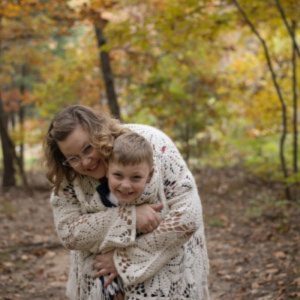Cassie Drope

My sepsis journey began in February 2018, the very week for Sepsis Survivors. I had been feeling ill, but was at home taking care of my sick husband and making sure my son was getting to and from school. A fever kept me from my clinicals in nursing school. I went into my doctor’s office where my vital signs were mostly stable – with the exception that I was having an incredibly difficult time breathing and pain in my upper abdomen. I worked in the ER down below the office as a tech, and was proud of myself for getting checked out, instead of going straight to the ER.
The rapid flu came back negative – I was given a shot of medication for nausea and one for pain, and sent on my way. Two nights later, I was in the ER, approaching my coworkers because I truly could not breathe. Less than two hours after arrival, I was being intubated. Less than twelve hours after this, my blood pressure became almost incompatible with life.
Rushed to a room in the ER, the doctor (one I had worked with side-by-side) ordered two pressure bags of fluid and a stat CT of my lungs, suspecting I was throwing a blood clot. My blood pressure appeared normal, but for someone who always has run on the high side I knew it was off. I could barely raise my hands above my head in the CT scan as I smiled at my co-workers and friends. The doc was rushed back to the scan, where he saw one of the worst pneumonias had developed in each of my lung bases. (Sepsis and Pneumonia) I was rushed back to my room where I jokingly told my nurse to mention to my husband (now ex) that he was an idiot for leaving me at the door. I was sitting straight up in the bed when the doctor came in and stated that he would like to intubate because I was having such a hard time breathing. Let me pause here, as I knew what this means – I had seen it countless times in my time in the ER as a tech – I looked him straight in the eye and said, “Yes, please.” I was then taken to a trauma room, the doctor told me months later that he had never seen in his career the amount of drainage that came out of the tube before. The labs came back, my whole body was fighting infection – sepsis – and my kidney and liver were shutting down.
I was transferred to the ICU. None of my coworkers were certain if I would make it. My blood pressure dropped to 37/15 – the arterial line confirming. My family gathered, and my seven year old son watched his momma in a bed dying. I scribbled in my twilight sleep his name. He was placed on my chest, and I know in this moment he kept me alive, his little heartbeat against mine, like the day he was born. It took two rounds of dialysis, all of the meds possible (plus one experimental) to keep my blood pumping, multiple antibiotics (one of which I developed an allergy to), a ventilator, and sheer unconscious will power to keep me alive long enough to fight off sepsis.
I remember waking up – it was day 8, the intubation tube was still in my throat, the room was dark and my nurse was there. I fell back asleep and saw my mother-in-law; she rubbed my hand and said that she would be back when the tube came out. The doctors were able to determine that I could breathe on my own, and out the tube came. From that point on I was loopy, as I still had many medications floating around in me. My body was so weak, I had lost 20 pounds of muscle in a week. But I could hold my son in the bed, I could smile and see my family around me. I was given the ok to eat – but everything tasted so weird. Sitting up for the first time made me laugh when the therapist said I would walk – I truly did not believe her. Two more ICU days and I was transferred to floor care. Less than a week later, I was home and starting home health services. Two months later I was back to work on light duty, and a year later I was back in nursing school.
I walked away with high blood pressure and damaged vocal cords – I don’t know if I will ever sing again. I spent many nights looking through the research on septic survival, only to find that there are not studies done of those in their 30s, and many of those who do wind up septic do not make it by year 1. This week of awareness had brought everything fresh again in my mind – I am not alone and I am a survivor. Those first months I struggled to understand, “Why me?” I am still trying to find an answer, but now I have a new label: Survivor. With that label comes strength, perseverance, and purpose. I know I must continue to share my story so that others can be encouraged to continue to fight. I am not defined by the experience, but rather the experience has helped to mold and shape who I am, and who I will become.






























